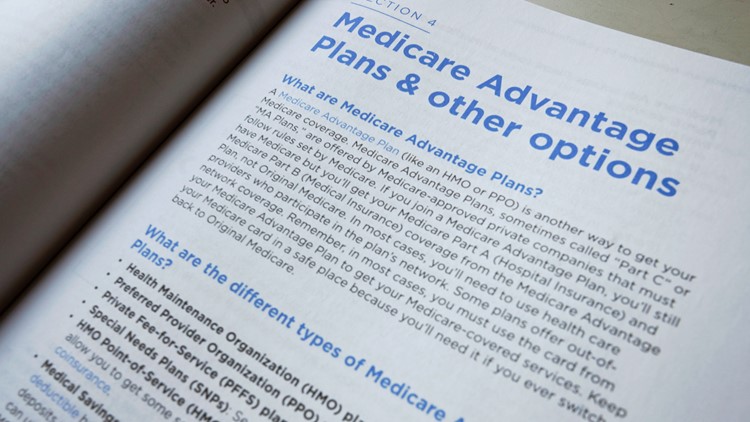Medicare’s open enrollment period, which gives people the opportunity to make changes to their health or prescription drug plans for 2025, runs through Saturday, Dec. 7.
Online ads and TV commercials often claim that people can receive a variety of added benefits, such as grocery allowances and free gym memberships, if they sign up for a specific Medicare Advantage plan.
Many VERIFY readers have asked us about Medicare Advantage ads and the benefits they claim the plans offer.
THE SOURCES
- Centers for Medicare and Medicaid Services (CMS)
- AARP
- Medicare Rights Center, a nonprofit organization
- Medicare Advantage plans from several private health insurance companies
- National Council on Aging (NCOA)
- Mississippi Insurance Department
WHAT WE FOUND
Medicare is federal health insurance for anyone age 65 and older, and some people under 65 with certain disabilities or conditions. It’s made up of four parts: A, B, C and D.
The traditional Medicare plan, which is called original Medicare, is run by the federal government. It includes Medicare Parts A and B, which are known as hospital and medical insurance.
Medicare Advantage, which is also known as Part C, is an alternative to original Medicare, AARP explains. The federal government contracts with private insurers to run Medicare Advantage plans.
Medicare Part D is prescription drug coverage.
1. Are Medicare Advantage plans different from original Medicare?
THE ANSWER
Under Medicare Advantage, people essentially join a private insurance plan like they may have had through their employer, AARP explains. That’s different from original Medicare, which is offered by the federal government.
Medicare Advantage plans bundle Medicare Parts A and B, which cover hospital care as well as most medically necessary services such as doctors’ visits and tests.
But, unlike original Medicare, Medicare Advantage plans often include Medicare Part D prescription drug coverage and other added benefits.
These additional benefits that aren’t included under original Medicare can include routine vision, hearing and dental care, as well as gym memberships.
Some Medicare Advantage plans may also offer a flex card, which is like a prepaid debit card designed to help pay for out-of-pocket health-related costs and some everyday expenses meant to improve the enrollee’s well-being, the AARP and the National Council on Aging say.
But Medicare Advantage providers that do provide flex cards may only offer them to people living in certain states or those with chronic health conditions, according to the National Council on Aging. For example, both Anthem and Humana promote their cards with disclaimers saying that the benefits may be available through plans offered to people with chronic illnesses or conditions.
Another key difference between original Medicare and Medicare Advantage plans are the costs.
Under original Medicare, the federal government sets the premiums, deductibles and coinsurance amounts for Parts A and B.
Most people with original Medicare pay a standard monthly part B premium, which will be $185 in 2025 – an increase of $10.30 compared to the 2024 standard monthly premium. They are usually responsible for paying a 20% coinsurance for covered health services after meeting their deductible, too.
People with Medicare Advantage plans must still pay the annual Part B premium set by the government, and sometimes an additional monthly premium for their specific plan.
But, unlike original Medicare, most Medicare Advantage plans have set copay amounts for doctor’s visits instead of the 20% coinsurance. This typically means people with Medicare Advantage plans will pay lower out-of-pocket costs than those on original Medicare, according to AARP.
Other differences include provider access and out-of-pocket limit, the nonprofit Medicare Rights Center explains.
Under original Medicare, people can see any provider that accepts Medicare. But people with private Medicare Advantage plans can usually only see in-network providers.
Original Medicare plans also do not have an out-of-pocket limit, while Medicare Advantage plans do. Medicare Advantage plans will pay the full cost of your care after you reach this limit, the Medicare Rights Center says.
2. Are all Medicare Advantage plans the same?
THE ANSWER
Not all Medicare advantage plans are the same. The costs and benefits people will receive vary based on the plan they choose.
The federal government offers a Medicare coverage comparison website where people can search by ZIP code to find a plan in their area and see the types of benefits it offers. If a person has more questions about a plan, they can select “Plan Details” to get the insurer’s contact information.
People without internet access can also call 1-800-MEDICARE, or 1-877-486-2048 for people who are deaf or hard of hearing, for help with finding and comparing plans in their area.
VERIFY looked at several 2025 Medicare Advantage plans offered through different insurers.
For example, one Humana Medicare Advantage plan offers vision, dental, hearing, fitness, telehealth and prescription drug benefits. The plan does not offer over-the-counter drug benefits, which are sometimes included in other Medicare Advantage plans.
The Humana plan does not have a monthly premium – apart from the Standard Part B premium – or a drug deductible.
Another Medicare Advantage plan offered by Aetna offers many of the same benefits as the Humana plan. However, it does include a $450 drug deductible, or the amount you pay for drugs before your plans to pay any drug costs.
The out-of-pocket maximum costs and copays also vary by plan.
3. Are there ways to protect yourself from Medicare and Medicare Advantage scams?
THE ANSWER
There are scammers who try to take advantage of people looking into their options for Medicare plans.
In general, people should be suspicious of anyone who calls, emails or visits them promoting a Medicare plan, according to AARP.
“Legitimate Medicare plans can only contact you if you’ve requested information or if you have an existing relationship with them,” AARP says.
If someone unfamiliar calls asking for your personal information, such as your Medicare or Social Security numbers, the National Council on Aging (NCOA) says you should hang up.
You should also ask agents to provide a comparison of a Medicare Advantage plan they are selling to the plan you already have, including out-of-pocket costs and deductibles. If they are unable to do so, do not buy the plan, the Mississippi Insurance Department says.
The NCOA provides more more Medicare scam red flags to watch out for:
Promises of free items or services: People should be suspicious of any offers involving no-cost medical supplies, medical care or prescription drugs. Many of these scammers will persuade people to share their Medicare number and then use that information to file high-cost claims in their name.
Pressure to switch your Medicare plan: A scammer who falsely claims to be from Medicare may say someone is “pre-approved” for a new health care or drug plan with lower premiums or better benefits. They may tell you there’s a fee to enroll in this new plan.
Notices to renew or upgrade your Medicare card: A scammer may call and say a person needs to activate, renew, or upgrade their Medicare card. They may ask for your Medicare number to “verify” your account or request that you pay a processing fee.
Threats to cancel your coverage: People may receive a call stating there’s a problem with their Medicare account, such as fraudulent activity. The caller says a person’s benefits will be canceled if they don’t immediately verify their personal information or join a new plan.
Claims you are eligible for a refund: Another tactic scammers use is telling older adults they qualify for a refund due to changes in their Medicare plan. The scammer may ask for their Medicare number or bank account details.
You can report potential Medicare scams by calling 1-800-MEDICARE (800-633-4227) or submitting a report online to the Federal Trade Commission (FTC).



